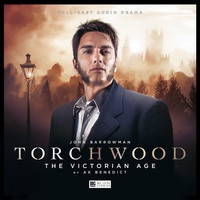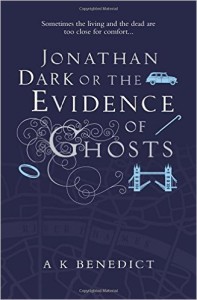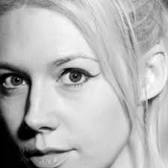Guest Post: A.K. Benedict – The Sound of Writing
A busy few weeks coming up for my guest today A.K. Benedict. Not only is her new novel, Jonathan Dark and the Evidence of Ghosts, published on 25th February but March sees the release of her Torchwood audio play – The Victorian Age – from the wonderful team at Big Finish.
With two very different projects coming to fruition in such a short space of time I was keen to find out a little more about the ‘sound’ of a story and how the author hears the characters.
My most sincere thanks to A.K. Benedict for unexpectedly bringing Captain Jack to my blog and for brilliantly answering the questions I had such trouble phrasing!
 While reading Jonathan Dark I discovered that you had written a Torchwood play for Big Finish (I have been a BF fan for many years). As I read I try to envisage characters and how they may speak…Jonathan Dark was (for me) very London – setting it around the Thames fixed that perception early in the story.
While reading Jonathan Dark I discovered that you had written a Torchwood play for Big Finish (I have been a BF fan for many years). As I read I try to envisage characters and how they may speak…Jonathan Dark was (for me) very London – setting it around the Thames fixed that perception early in the story.
When you write for Torchwood the cast (and their voices) are so well known…a Welsh accent for Gwen, Jack’s American/Scottish twangs etc. Does that make it easier to feed the lines?
YES! I have been a fan of Captain Jack for ten years so I know his voice very well. I also rewatched Dr Who and Torchwood episodes before I began writing the script – it felt at once naughty and virtuous to do this for an actual job, not just my pleasure! This made it wonderfully easy to slip into character while writing and, hopefully, to get as near as I could to Captain Jack’s tone, rhythm and wit. His quips darted onto the page without much intervention, as if repeated viewing had led me to internalise him, as it were. I have only written for Jack out of the original Torchwood characters so far but I hope the same would apply, it certainly did while writing Queen Victoria, the other main character in ‘The Victorian Age’. Her character, played by Pauline Collins, was so distinctive in ‘Tooth and Claw’ that it made it much easier to expand and build on, even though Rowena Cooper’s Victoria in TVA is nearing the end of her reign and life.
When you write an audio play do you hear the actors voices speaking the lines?
Definitely – it is as if I have audio playback in my brain! When the voices stop, I know it is time to take a break and make a cup of tea.
How does that differ from a novel where you create the characters from scratch, do you give them a voice?
Writing for existing characters is a case of slipping on their coats; for original characters, I tailor an entirely new set of clothes, right down to the pants and socks. This takes some time and is full of surprises. I start by asking them questions and then scribble down their answers. When I interviewed Jonathan in a coffee shop in 2007 (he had a caramel latte and a BLT), he told me all about his life situation, worries, likes and dislikes, pets, comics, shortcomings and shadows. His revelations, and the broken way he saw the world, gave me an insight into his narrative voice. The rest came when I started writing.
I feel like a medium at times – very appropriate for ‘Jonathan Dark. . .’ –transcribing from the other side. Maria from ‘Jonathan Dark’ and Stephen Killigan from ‘The Beauty of Murder’ came very quickly. As did Jackamore Grass. It’s unnerving to have a murderer’s voice, like Jackamore or the stalker in ‘Jonathan Dark or The Evidence of Ghosts’, speaking through me. At the end of a chapter, it is a relief to step out of their blood-stained clothing.
The next step in this question comes when you pass your novel to the team that will turn it into an audiobook. Does the narrator of the audiobook change how you had intended a character to sound? As most authors will not hear their books read aloud by their readers is it strange to see how actors or narrators interpret your writing?
It is very strange but also fun. Sometimes lines are performed just as I intended, sometimes much better, sometimes it jars with what was in my head. That’s as it should be. Once the words are on the page and out in the world, a book becomes another entity. Readers hear different voices, make different pictures to the ones in my head and that is beautiful – the alchemy of reading a book and creating something new.
In a collaborative medium like drama and audio work, it is so exciting to hear what actors make of a script or story. Rowena Cooper elevated every single line as Queen Victoria, performing with pathos, gravitas and panache and John Barrowman as Captain Jack was even better than I had hoped. I grinned all the way through the recording. Some of it was as I imagined while writing; some not all: every bit was delightful. I was lucky enough to play a teeny cameo in ‘The Victorian Age’, and even I didn’t perform it as I’d heard it in my head!
Last question, do the Big Finish actors look to make tweaks to your script to make a conversation ‘fit’ how they perceive the character would phrase a sentence?
 In my limited experience, the actors don’t play with lines much at all, bar an ad lib or two, some very funny outtakes and the odd line tweaked for ease of expression. They mainly bring their own skills, breathing life into a line and making it sing.
In my limited experience, the actors don’t play with lines much at all, bar an ad lib or two, some very funny outtakes and the odd line tweaked for ease of expression. They mainly bring their own skills, breathing life into a line and making it sing.
‘The Victorian Age’ is out in March from Big Finish and can be ordered here:
Jonathan Dark and the Evidence of Ghosts is published by Orion on 25 February 2016 and can be ordered here.